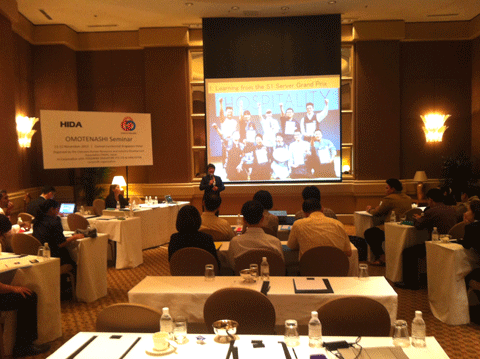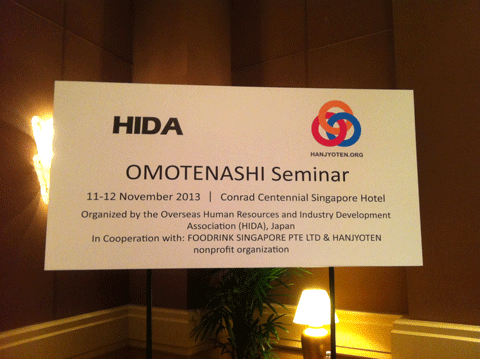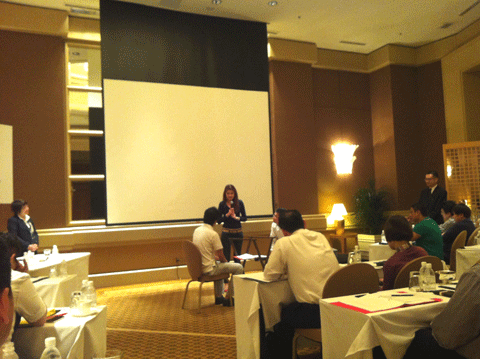By Craig Wilson Reported on November 12, 2013
Keywords : Hospitality Omotenashi Service
Funded by the Japanese Government and Organised by the Overseas Human Resources & Industry Development Association (HIDA), Japan and in Cooperation with Foodrink Singapore Pte. Ltd. & Hanjyoten (NPO) you can figure that this is a very important event. Previously this event was also held in Bangkok, Thailand where Foodrink Singapore Pte. Ltd. was also a representative and figurehead. Hanjyoten (NPO) was told host the Server Grand Prix in Japan where over 8,000 participants attend which has been running for 9 years and is a system of sharing knowledge between individuals.


22 persons attend Omotenashi Seminar.
At this event hosted by Kazuki Ide and Mikiko Okazaki from Hanjyoten (NPO) at the Conrad Centennial Singapore Hotel in the Grand Room on the 2nd floor the participants varied from the ages of 20-55 years old and were from:
• Glo Va! Pte. Ltd.
• RE & S Enterprises Pte. Ltd.
• Saintmare South East Asia Pte. Ltd.
• Enmane International Pte. Ltd.
• Plenus & MK Pte. Ltd.
Available at this event was an interpreter and the demonstrations and pointers were explained in the role play (as will be later explained) by Kazuki Ide from Hanjyoten (NPO).

Organised by the Overseas Human Resources & Industry Development Association (HIDA), Japan and in Cooperation with Foodrink Singapore Pte. Ltd. & Hanjyoten (NPO)
One fine example discussed was that 'Business is.....'Not how to make people come to buy from you but how they leave'.....Going to come!'
Some examples were given from participants of Good Service / Bad Service in Singapore. One said it's hard to judge from working in the service industry and there was no good service or bad service he was aware of.
On the 1st day lunch was indoor overlooking the outdoor pool on the 4th floor and talking to participants one chef from a Japanese establishment commented that he was very impressed by the chosen venue as he rarely gets a chance to see such places when working in the kitchen. Some pointers were that is it only just about service? What about the food? Isn't the food more important? Another person told me that there is a special saying in Japan that hospitality is service in specific cases and each one is different from the other so each one should be treasured!
After lunch on the 1st day the 7 basic steps in receiving customers were discussed, how you would describe your store so you can recommend and what would you say your job scope would be (one of these should be to make the customer SMILE and satisfied).
They discussed that in Japan they have 1st and 2nd assessments for their serving staff and national assessments for the lucky ones. They also discussed how important communication over the phone is and on checking if the customers have any allergies or specific preferences. A self-assessment page was reviewed to point out some of the points for servers (master at least 10 of these and work upwards (2nd day pointers)).
The role playing following was joined later by the 'boss who's difficult to please' Masaaki Yasuda. Topics were 'Tell me what is your best selling dish from your menu?' and 'I want to recommend your restaurant to my friend. How do I recommend this restaurant to my friend?' Some pointers were the 'Half-Step rule', 'attending the customer quickly' and 'standing still while delivering the service'. Also 3 points of recommendation 'fresh fish, price, and Japanese service hospitality'.

Role Play - Customers (Recommendations!)
On Day 2 before and after a Buffet Lunch at Oscar's on the 1st floor some examples of Japanese restaurants were 'Katanashi at Boat Quay and Sushi Ichi at Scotts Square (next to the Hyatt Hotel) in Singapore. The former targeting Singaporeans and making them feel at home and where the staff build close relationships with their customers. The latter at S$300pax the chefs serve their customers or give recommendations and estimate timing etc. Most Japanese customers already know their preference, speed, stomach capacity, etc. and prefer the chef special service.
An example to leave you with: Scandinavian Airlines Service is voted one of the best services in the world but previously they almost went bankrupt before they started asking passengers for their ratings and comments. During the entire course of their single journey passengers had made approximately 1,800 comments. Scandinavian Airline Service took these all into account and avoided their problems and rose above the rest in the airline industry!





